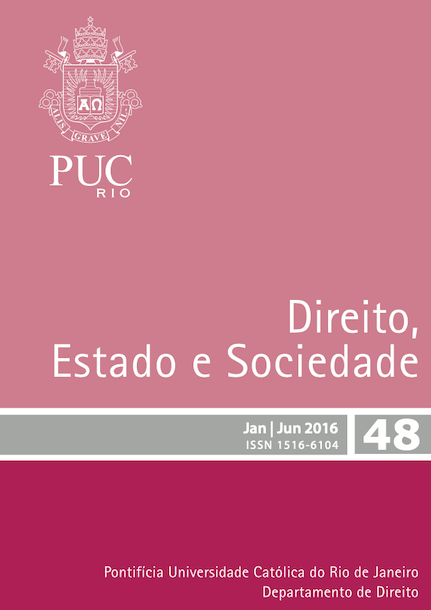A Análise do Discurso Ideológico do Direito e a Teoria do Agendamento Midiático / The Analysis of the Ideological Discourse of Law and the Agenda-Setting Theory
DOI:
https://doi.org/10.17808/des.48.494Palavras-chave:
Media, Public opinion, Ideological legal speech, Ideology, Information societyResumo
Resumo: Aborda-se a formação do discurso ideológico do Direito e a influência do agendamento promovido pela mídia na formação da opinião pública, bem como a apropriação e/ou a influência da mídia na formação do discurso jurídico. Consta-se que as decisões judiciais cada vez mais são divulgadas e comentadas por especialistas nos meios de comunicação, especialmente as mais polêmicas, o que produz reflexividade "causa-efeito" entre os agendamentos noticiados e a consequente influência no ajuizamento de demandas, provocando a indagação se a legitimação do discurso dos profissionais do Direito sustenta-se apenas em fundamentos jurídicos e sociais ou se também sofre influência ideológica dos meios de comunicação. Conclui-se que o discurso jurídico é resultado de inúmeras ideologias, intensamente influenciadas pela opinião pública, que por sua vez também é determinada pelo agendamento promovido pela mídia.
Palavras-chave: Mídia; Opinião pública; Discurso ideológico do direito; Ideologia; Sociedade da informação.
Abstract: This paper deals with the formation of the ideological discourse of law and the influence that the agenda setting promoted by the media has in the formation of the public opinion, as well as with the appropriation and/or influence of the media in shaping the legal discourse. It is noted that court decisions are increasingly disclosed and commented by experts through the media, especially the most controversial, which produces a "cause and effect" reflexivity between the reported agenda and the consequent influence on the filing of demands, which causes questioning if the legitimacy of the legal practitioners' speech supports itself only on legal and social grounds or if it is also influenced by the media. It concludes that the legal discourse is the result of many ideologies, heavily influenced by public opinion, which in turn is also determined by the agenda setting promoted by the media.
Keywords: Media; Public opinion; Ideological legal speech; Ideology; Information society.
Referências
ABBAGNANO, Nicola. Dicionário de Filosofia. São Paulo: Martins Fontes, 1998.
ALTHUSSER, Louis. A favor de Marx. Rio de Janeiro: Zahar, 1979.
ALTHUSSER, Louis. Ideologia e Aparelhos Ideológicos do Estado (notas para uma investigação) In: Zizek, Slavoj (org.). Um Mapa da Ideologia. Rio de Janeiro: Contraponto Editora Ltda, 2013. p. 105/141.
ASCENSÃO, José de Oliveira et al. Estudos sobre direito da internet e da sociedade da informação. Coimbra: Almedina, 2001.
BENITES, Marcello Riella; MOURA, Sérgio Arruda. Cotas raciais na Universidade: O Discurso dos Ministros do STF fragmentado na divulgação midiática. Cadernos do CNLF, Vol. XVI, nº 04, t. 1 - Anais do XVI CNLF, pág. 414/425.
CARVALHO, Laíz Barbosa de (co-autora). Dicionário Larousse da língua portuguesa. São Paulo: Editora Lafonte, 2009. (verbete Mídia).
CERQUEIRA, Guilhermo Rojas. O Conceito de ideologia e a ideologia do direito em Althusser. Revista Critica do Direito. Numero 02, Volume 47, 2014.
COLARES, Virgínia. Linguagem & Direito. Recife: UFPE, 2010.
FOUCAULT, Michel. A ordem do discurso. Ijuí: Fidene, 1973.
GREGOLIN, Maria do Rosário Valencise. A Análise do Discurso: conceitos e aplicações. Alfa, São Paulo, 39, 1995. 13-21.
GUERRA, Vânia Maria Lescano. Uma reflexão sobre alguns conceitos da análise do discurso da linha francesa. An. Sciencult, v.1, n.1, Paranaíba, 2009. p. 5-18.
JAPIASSU, Hilton e MARCONDES, Danilo. Dicionário Básico de Filosofia. Rio de Janeiro: Jorge Zahar, 2001.
LATTMAN-WELTMAN, Fernando. Cidadania e Audiência no Telejornalismo Comunitário. In: GOMES, Angela de Castro (coord). Direitos e Cidadania: Justiça, Poder e Mídia. Rio de Janeiro: Editora FGV, 2007.
McCOMBS, Maxwell. A Teoria da Agenda: A mídia e a opinião pública. Petrópolis: Vozes, 2009.
MORIN, Edgar. A comunicação pelo meio: teoria complexa da comunicação. Revista da Famecos. n. 20, p. 7-12, Abril 2003.
ORLANDI, E. P., GUIMARÃES, E. Unidade e dispersão: uma questão do texto e do sujeito. In: ORLANDI, E. P. et al. (1988). Sujeito e Texto, série Cadernos PUC. São Paulo: EDUC, 1988. p. 17-36.
PASSOS, Izabel C. Fichte. Poder, Normalização e violência: incursões foucaltianas para a atualidade. Belo Horizonte: Autentica Editora, 2013.
TIBURI, Márcia. Filosofia prática: ética, vida cotidiana, vida virtual. Rio de Janeiro: Record, 2014. p. 122
WOLF, Mauro. Teoria da Comunicação. Lisboa: Editorial Presença, 2001.
Internet
BRASIL. Supremo Tribunal Federal. ADPF 186. Disponível em Ë‚http://redir.stf.jus.br/paginadorpub/paginador.jsp?docTP=TP&docID=6984693˃. Acesso em 11/04/2015.
FRANÇA, João Irineu; SOUSA, Francinete F. A Afirmação das Cotas Raciais nas Universidades e o Discurso Naturalizado do Preconceito: uma análise do gênero discursivo jurídico. Disponível em Ë‚www.gelne.orb.br/site/arquivostrab/1251. Acesso em 11/04/2015.
PESSOA, Flávia Moreira Guimarães; NETO, Dilson Cavalcanti Batista. Liberdade de religião, estado laico, autonomia universitária, princípio da igualdade: Uma análise da posição do STF no Julgamento da ADI 2806-5. Revista Eletrônica da Amatra XX, Aracaju, n. 19, Abril/Junho 2009. Disponível em: < http://www.amatra20.org.br/amatrawi/artigos.wsp?tmp_codartigo=459 >. Acesso em: 03/08/2015.
Downloads
Publicado
Como Citar
Edição
Seção
Licença
A submissão de artigos para publicação na Revista Direito, Estado e Sociedade implica a concordância dos autores com os seguintes termos:
1. O(s) autor(es) autoriza(m) a publicação do texto em número da Revista;
2. O(s) autor(es) asseguram que o texto submetido é original e inédito e que não está em processo de avaliação em outra(s) revista(s);
3. O(s) autor(es) assumem inteira responsabilidade pelas opiniões, ideias e conceitos sustentados nos textos;
4. O(s) autor(es) concedem aos editores o direito de realizar ajustes textuais e de adequação ao padrão de publicação da Revista;
5. Permite-se a reprodução total ou parcial dos trabalhos, desde que explicitamente citada a fonte.













